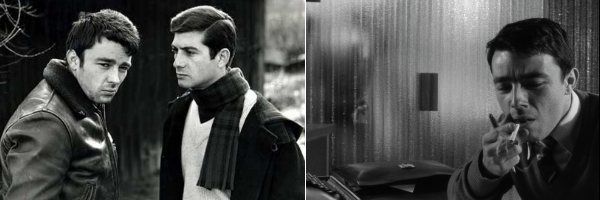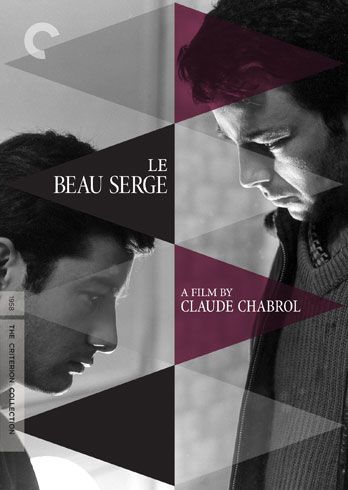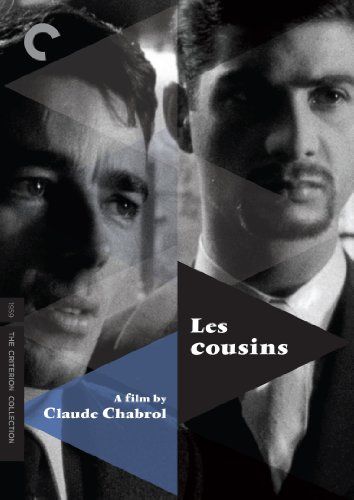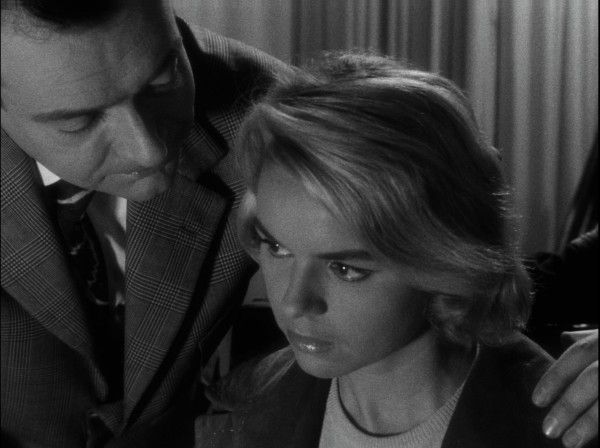For all the talk of the French New Wave, it’s worth noting that it was Claude Chabrol who was first to have his films grace the big screen. Le Beau Serge was the first movie released from the Cahiers du Cinema set, and it is not the thriller one might expect from Charbol – who later reinvented himself as a French Hitchcock, though that definition is too small for the director. His first two films – Le Beau Serge and Les Cousins, both starring Gérard Blain and Jean-Claude Brialy, are now on Blu-ray from the Criterion Collection, and our reviews follow after the jump.
Le Beau Serge was born after Les Cousins, but was shot first. Blain is the titular Serge, the man who lives in a small French village with his pregnant wife (Michèle Méritz). Brialy is Francois, who left town and was living in Sweden recently because of what may be tuberculous. Serge spends much of his time drunk, partly because his first attempt at having a child led to a deformed child that died shortly after birth.
Francois enterts the town both a familiar face and a stranger. He immediately shacks up with Marie (Bernadette Lafont), who is living with the old man Glomaud (Edmond Beauchamp). Glomaud has convinced himself that Marie is his daughter, but no one knows for sure, and most doubt it. Marie’s not so much a tramp but sexually open/bored, and so their relationship quickly fades, though Glomaud presses Francois about his relationship, and gets an answer about whether Marie is his daughter or not. Serge notes that he really didn’t want to know because he spent much of his time thinking about sleeping with her.
Serge and Francois grew up together, but they’ve become very different people, and eventually their relationship becomes strained when Serge starts actively cheating on his wife with Marie (and all evidence points to it not being the first time).
Charbol’s text here is so thoroughly considered a portrait of small town life and human interaction that it’s the sort of film that seems to spring more from a director in his autumnal years than an upstart. It’s a great work about people and sex and boredom, and it’s interesting then that Les Cousins was written first because that’s the film that plays more like a first time work.
Les Cousins switches roles for Blain and Brialy. In this one Blain is Charles, the small town boy who comes to the big city to live with his cousin Paul (Brialy), is the more obvious interlopper, and plays shy to his cousin’s more gregarious persona. Paul likes to party and keeps company with strange men who seem to be involved in shady business. Paul also throws parties all the time, though both are studying to be lawyers.
Though Paul is constantly dating women, it’s when Charles falls for Florence (Juliette Mayniel), a young party girl who’s happy to have the interests of a nice boy, that a triangle develops. She tries to convince herself to love Charles and his puppydog ways, but ends up sleeping with Paul when she’s get the time wrong for an afternoon with Charles. Strangely the group come to live together for the semester, and Charles decides the best way to get her attention is to study and not care. He cares, but he tries not to let it show. Then come finals.
While both films show a mature hand behind the camera for someone so fresh to the work, Les Cousins has a storyline that feels more immature, from its politics and resolution. But for those looking to get into Chabrol, Criterion has offered the best introduction available with these two films.
The Criterion edition of Le Beau Serge is presented in its correct aspect ratio (1.33:1) and in 2.0 Monaural sound. The transfer is excellent, and it looks good, with little to no bleshmises or faults. The film also comes with a commentary by Chabrol scholar Guy Austin. It features more extras than Les Cousins, with the documentary “Claude Chabrol: Mon Premiere Film” (52 min.) getting Chabrol, Brialy, Bernadette Lafont and many associated with the film to talk about making it. It’s followed by “L’Invite du dimanche” (10 min.), which offers a 1969 interview with the director on the making of the film. It’s followed by the film’s theatrical trailer.
Les Cousins comes in its original aspect ratio (1.33:1) and in 2.0 Monaural sound. It comes with a commentary by film scholar Adrian Martin, and both commentary tracks are smart and thorough. Its only extra is the film’s theatrical trailer.




